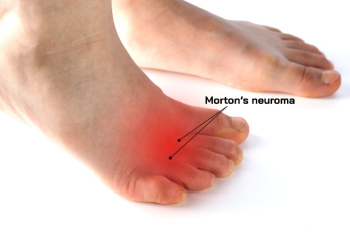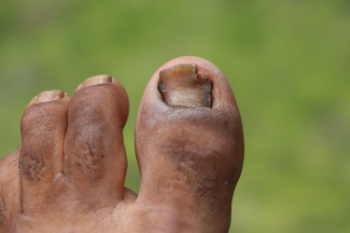
Roy A. Rothman, DPM, PA
Podiatric Medicine and SurgeonFoot & Ankle Specialist


Morton's neuroma is a painful condition characterized by a thickening of the tissue surrounding the nerves leading to the toes, often resulting in a sensation akin to stepping on a pebble. It primarily affects the ball of the foot, typically between the third and fourth toes, and is more common in women and those who wear tight or high-heeled shoes. Prevention strategies include wearing properly fitting footwear with adequate support and cushioning. Diagnosis involves a physical examination, possibly supplemented by imaging tests, such as MRI scans or ultrasounds. Treatment options range from conservative measures such as custom-made orthotics and steroid injections to surgical removal of the affected tissue. If you have this type of foot discomfort, it is suggested that you schedule an appointment with a podiatrist for an accurate diagnosis and treatment plan.
Morton’s neuroma is a very uncomfortable condition to live with. If you think you have Morton’s neuroma, contact Roy Rothman, DPM of Florida. Our doctor will attend to all of your foot care needs and answer any of your related questions.
Morton’s Neuroma
Morton's neuroma is a painful foot condition that commonly affects the areas between the second and third or third and fourth toe, although other areas of the foot are also susceptible. Morton’s neuroma is caused by an inflamed nerve in the foot that is being squeezed and aggravated by surrounding bones.
What Increases the Chances of Having Morton’s Neuroma?
Morton’s neuroma is a very treatable condition. Orthotics and shoe inserts can often be used to alleviate the pain on the forefront of the feet. In more severe cases, corticosteroids can also be prescribed. In order to figure out the best treatment for your neuroma, it’s recommended to seek the care of a podiatrist who can diagnose your condition and provide different treatment options.
If you have any questions, please feel free to contact our office located in DeBary, FL . We offer the newest diagnostic and treatment technologies for all your foot care needs.

Toenail fungus, also known as onychomycosis, is more than just a cosmetic concern. It is a chronic problem that can cause discomfort and affect quality of life. It occurs when fungi infect the toenail, often thriving in warm, moist environments like sweaty shoes or locker rooms. Factors such as poor hygiene, a compromised immune system, aging, or underlying health conditions like diabetes can increase the risk of toenail fungus. The infection typically begins as a white or yellow spot under the nail, gradually spreading and thickening the nail, causing brittleness, discoloration, and even odor. Individuals who frequently wear closed-toe shoes or have a history of nail trauma are particularly susceptible. If you have toenail fungus, it is suggested that you consult a podiatrist for a proper diagnosis and management. Treatment can include prescribed topical or oral antifungal medications, laser therapy, or surgical intervention, tailored to the severity of the condition.
For more information about treatment, contact Roy Rothman, DPM of Florida. Our doctor can provide the care you need to keep you pain-free and on your feet.
Toenail Fungus Treatment
Toenail fungus is a condition that affects many people and can be especially hard to get rid of. Fortunately, there are several methods to go about treating and avoiding it.
Antifungals & Deterrence
Oral antifungal medicine has been shown to be effective in many cases. It is important to consult with a podiatrist to determine the proper regiment for you, or potentially explore other options.
Applying foot powder on the feet and shoes helps keep the feet free of moisture and sweat.
Sandals or open toed shoes – Wearing these will allow air movement and help keep feet dry. They also expose your feet to light, which fungus cannot tolerate. Socks with moisture wicking material also help as well.
If you have any questions please feel free to contact our office located in DeBary, FL . We offer the newest diagnostic tools and technology to treat your foot and ankle needs.
 Pregnancy, particularly during the third trimester, can contribute to pain in the front of the foot. This discomfort is mostly because of natural weight gain and the resulting increase in pressure on the feet. Additionally, hormonal changes during pregnancy cause the ligaments in the body to relax and stretch in preparation for childbirth, which can lead to a spreading of the feet and a decrease in arch support. This combination of factors can strain the forefoot and lead to conditions like plantar fasciitis, which results in pain and inflammation in the ball of the foot or heel. Podiatrists, or foot doctors, can provide personalized advice on how to manage this pain. Suggestions may include wearing supportive footwear, custom orthotics, and engaging in gentle foot exercises. If you are pregnant and experiencing foot pain, it is suggested that you consult a podiatrist.
Pregnancy, particularly during the third trimester, can contribute to pain in the front of the foot. This discomfort is mostly because of natural weight gain and the resulting increase in pressure on the feet. Additionally, hormonal changes during pregnancy cause the ligaments in the body to relax and stretch in preparation for childbirth, which can lead to a spreading of the feet and a decrease in arch support. This combination of factors can strain the forefoot and lead to conditions like plantar fasciitis, which results in pain and inflammation in the ball of the foot or heel. Podiatrists, or foot doctors, can provide personalized advice on how to manage this pain. Suggestions may include wearing supportive footwear, custom orthotics, and engaging in gentle foot exercises. If you are pregnant and experiencing foot pain, it is suggested that you consult a podiatrist.
Pregnant women with swollen feet can be treated with a variety of different methods that are readily available. For more information about other cures for swollen feet during pregnancy, consult with Roy Rothman, DPM from Florida. Our doctor will attend to all of your foot and ankle needs.
What Foot Problems Can Arise During Pregnancy?
One problem that can occur is overpronation, which occurs when the arch of the foot flattens and tends to roll inward. This can cause pain and discomfort in your heels while you’re walking or even just standing up, trying to support your baby.
Another problem is edema, or swelling in the extremities. This often affects the feet during pregnancy but tends to occur in the later stages.
How Can I Keep My Feet Healthy During Pregnancy?
If you have any questions please feel free to contact our office located in DeBary, FL . We offer the newest diagnostic and treatment technologies for all your foot and ankle needs.